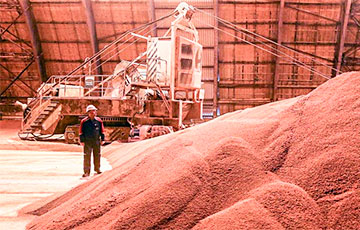Potassium Disrupts Lukashenka's Plans
5- 26.07.2023, 16:04
- 28,794

What is happening on the world market against the backdrop of sanctions?
Potash salt is the main export of Belarus. However, with the introduction of EU sanctions, supplies fell by almost three times. This year, the Belarusian authorities are recording growth, but competitors are significantly reducing the price. See whether Belarus will be able to dump in response, and whether it is worth waiting for the easing of sanctions on potash, in the report by the Deutsche Welle.
Is Belarus adapting to sanctions?
First Deputy Prime Minister of Belarus Mikalai Snapkou said that Belarus will sell 8 million tons of potash fertilizers this year. In the best years, the country supplied 10-12 million tons of potassium per year, in 2022 exports fell to 4.5 million tons — this is the effect of the sanctions imposed by the West on Belarus.
Snapkou claims that Belaruskali is working “with a profit”, but does not specify how big it is. Since 2021, the authorities have classified export data. And in 2022, the Salihorsk district, where Belaruskali is located, became the record holder in terms of lowering wages.
The government has developed a draft decree, according to which the Belarusian Potash Company will be able to take loans for prepayment to Belaruskali. The terms of the loan have not yet been announced. “This is the only way at the moment to provide the manufacturer with stable finances, because there are problems with settlements due to sanctions,” Snapkou explained. Experts note that although Belarus is adapting to the sanctions, the fall in prices on the world market may spoil the plans of the Lukashenka regime.
The price of potash is approaching a critical one for Belarus
Thus, China has signed a new contract with the Canadian company Canpotex. The price of supplies of potash fertilizers is almost twice as low as last year: $307 per ton instead of $590. The Belarusian Potash Company accused the Canadians of dumping. Last year, it was China that was the main consumer of Belarusian fertilizers — it accounted for almost half of exports.
A year ago, the average price of fertilizer was $800 per ton, this year the Fitch rating agency predicts an average price of $450. This is close to the upper limit that Belarus is counting on — at the beginning of 2023, Snapkou called a range of $400-450. “We must take into account, track and save every dollar in terms of logistics. Because the price is borderline, and we are not sure that this is the bottom,” said the First Deputy Prime Minister.
Belarus can no longer dump
Leu Lvouski, academic director of the BEROC research center, says that the decline in potash fertilizer prices is a long-term trend: “Fears about food security look extremely unfounded. We see that despite the war and sanctions, prices for grain and potash are gradually going down, that is, no crisis and famine, with which the Belarusian authorities tried to scare the world, are expected.”
Can Belarus get involved in a price war? “Earlier, we were very fond of playing dumping, but after the loss of the Klaipeda port, the cost of transportation increased by two and a half times. Plus, Russia has a logistics monopoly. And we do not know what share of the margin is taken by the Russian Federation — this information is classified,” said the BEROC representative.
Is it possible to cover logistical losses by increasing the volume of deliveries? “Belarus would have increased volumes a long time ago if it was possible,” says Lvouski. “By rail to China — a very long leg, it is impossible to transship the same volume that went through Lithuania this way. There is also a problem with Russian ports. The authorities seem to have abandoned the idea of building their own port — it's too expensive”.
Can potash sanctions be lifted?
Experts note that there are two key factors for improving the export of potash — the lifting of sanctions or the improvement of logistics. “Logistics will improve, but it takes time,” says Leu Lvouski. “We see that Belarus is adapting: we gradually learned to negotiate with new counterparties, find more and more wagons and containers for transportation, and increase capacities in certain ports.”
Sanctions will not be lifted in the near future, economists say. Although the countries of the global South are lobbying this issue through their European partners. Lithuania, Poland, Latvia are categorically against easing.
“The final word will be with Lithuania, and there this issue became the subject of domestic politics, when some ministers announced that they would resign if potash continued to pass through Klaipeda. So I doubt that Lithuania will back down,” says Lvouski.










